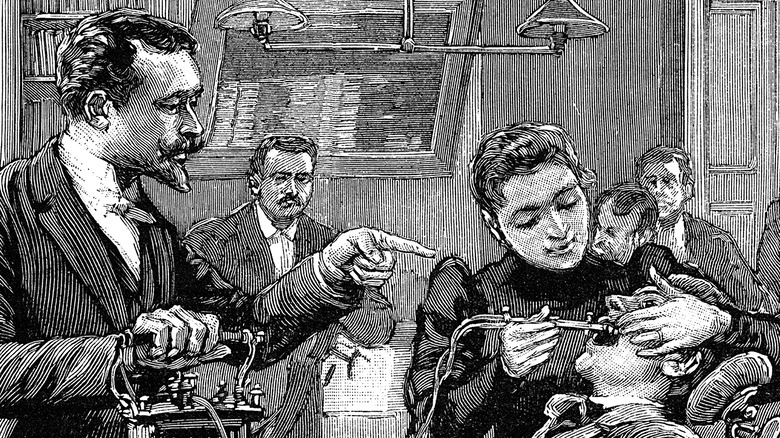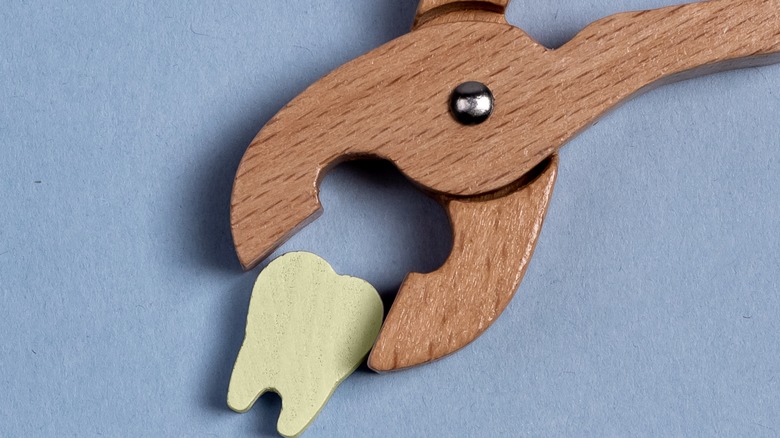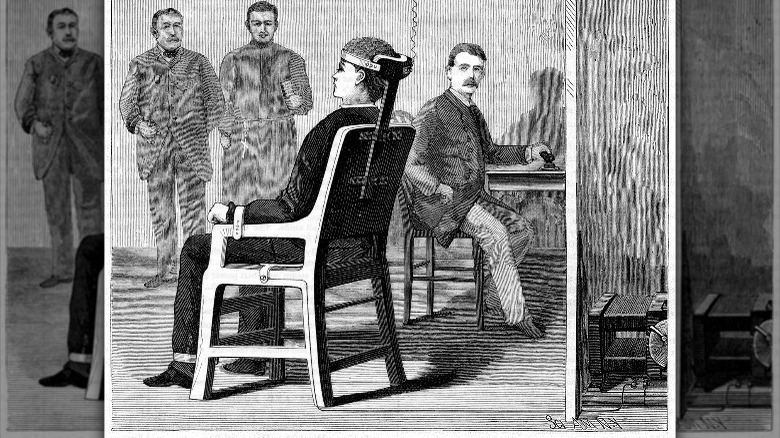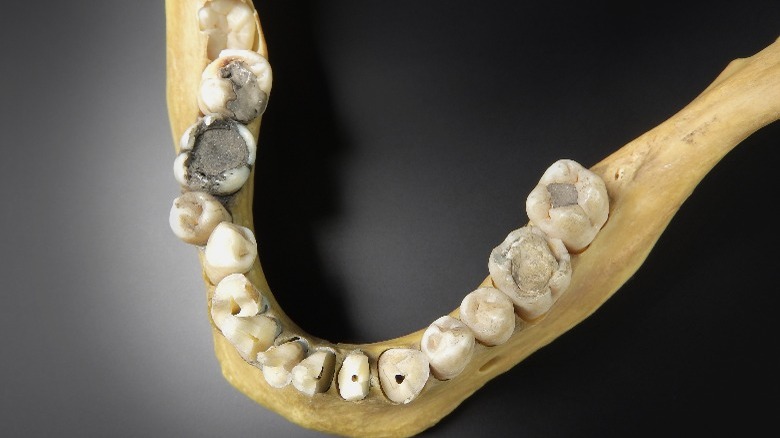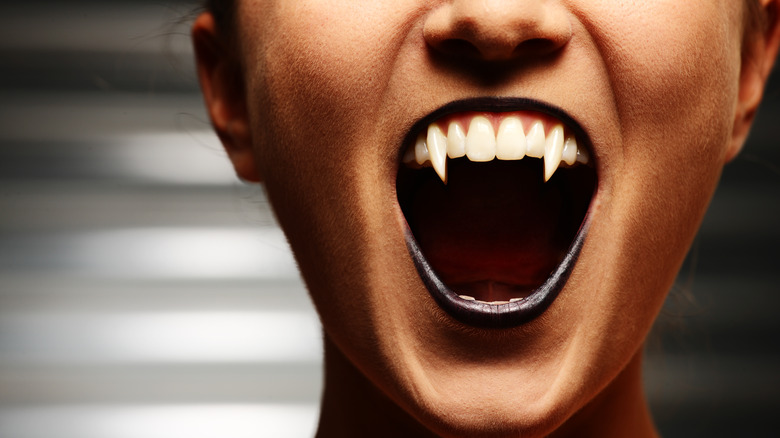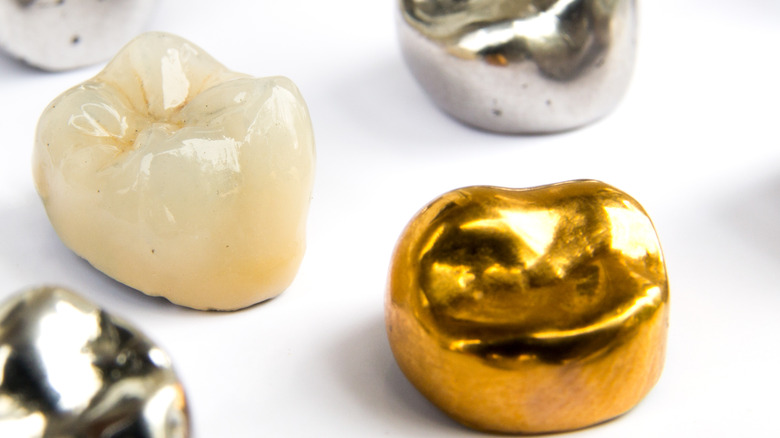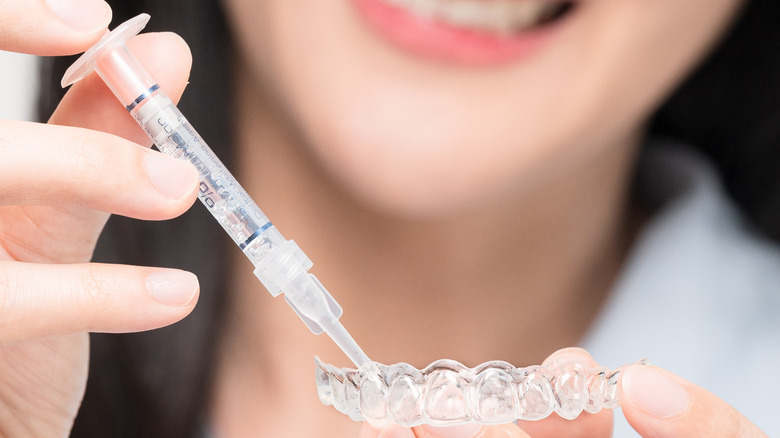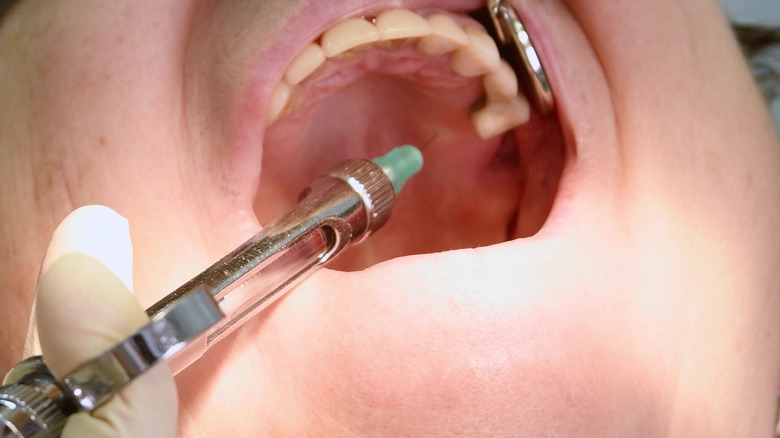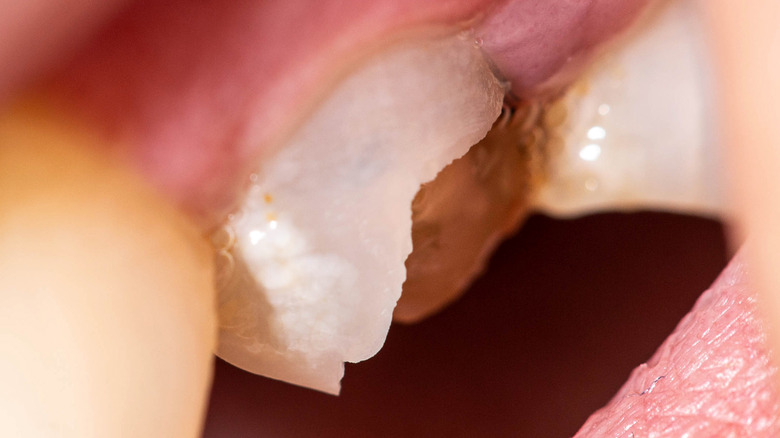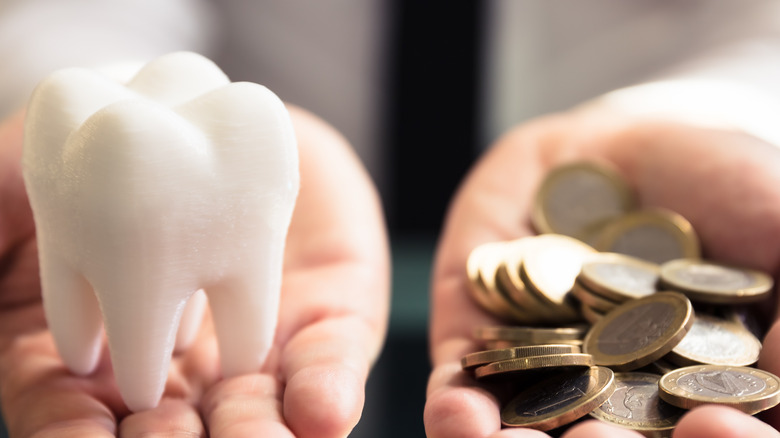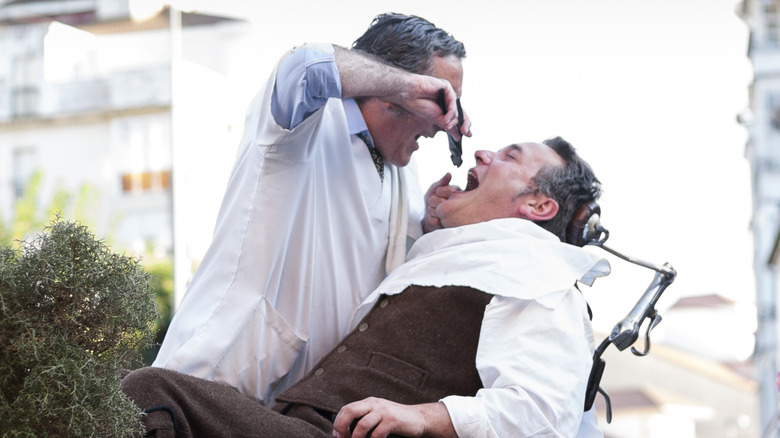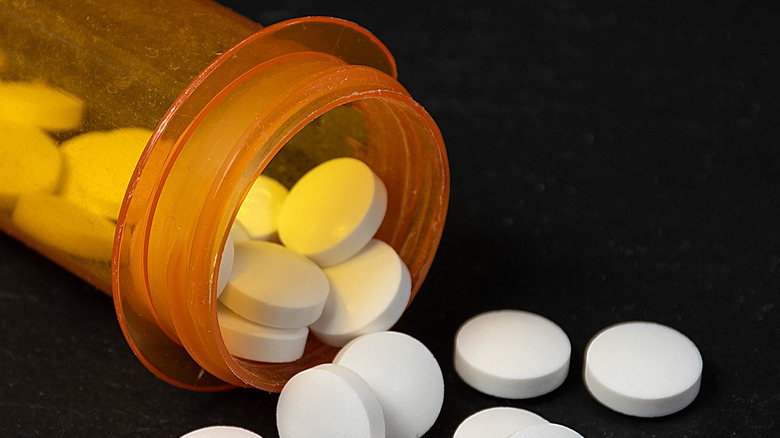Dark Secrets Of Dentistry Revealed
It's no secret that most of us feel something between resentment and mortal terror when faced with a stint in the dentist's chair. Yet dentistry being its own branch of medicine is a fairly recent phenomenon, and for a long time the closest you got to patient care was just having to sit down and let a tradesman wield something that looked like door key at your rotten teeth while trying to think happy thoughts, as per the BBC. It helped a lot if you were ignorant about the procedure — less so if the guy doing the wrenching and gouging was too (and many were).
Even though modern-day dentistry can be a lucrative field, a few dentists throughout history were into having side-hustles long before it became a word. Most practiced tooth-pulling as a sideshow to their main trades of iron-working and hair-cutting, but even well into the 19th century, you had dentists who moonlighted in other industries, including capital punishment, notes the Journal of the History of Dentistry. No-one was surprised when a dentist came up with the idea of the electric chair.
Modern dentistry can also go into very bizarre realms. From a black market for teeth (via Cracked) to substance abuse, as per Southworth Associates, darker undercurrents form part of the daily life of many dentists.
So despite efforts to rehabilitate their image, there are many reasons why dentists have that sinister reputation. Some of these reasons are historical; some are horrifyingly rooted (no pun intended) in the present.
It used to be done by barbers and blacksmiths
Once upon a time, physicians felt that performing any kind of surgery was beneath them, given the sullying tendency of patients to bleed and often die. Carving people up for their own good was therefore left in the hands of people who did this more often to inert materials — namely barbers, wig-makers, and blacksmiths.
According to the Atlantic, medieval dentists (and calling them that was definitely stretching the term to breaking point) went from town to town with their tools and did what needed to be done in people's gaping maws, chiseling out rotten teeth using an instrument called a "dental key," which was a sinister fusion of a hammer, a hook, and forceps. Different dental instruments for various purposes weren't developed until the 19th century (via the BBC).
Perhaps unsurprisingly, it wasn't a science treated separately from other kinds of surgery or medicine, as these tradesmen would be called upon to perform functions like bloodletting, enemas (injecting liquid into your lower bowl to clear it out — about as pleasant as it sounds), and the removal of limbs, notes the Atlantic. Given that they all involved a lot of wrist work, in its own twisted way this logic made sense. However the results could be disastrous, including one woman in 18th century-England who lost three teeth and part of her jaw bone after a botched intervention by a barber-surgeon, according to Thomas Bedmore's dental treatise.
It should go without saying that effective painkillers were rarely involved. If they were, then anything from mustard, arsenic and, you guessed it, our old friend the leeches were used. Being drunk also probably helped.
A dentist invented the electric chair
There's more than one reason you find the dentist chair so frightening — and it's a very rational one. The man to blame for giving dentistry an even more sinister reputation is Alfred P. Southwick, a late-19th century American entrepreneur whose professional life was ...eclectic.
The Journal of the History of Dentistry describes how Southwick worked as a steamboat engineer before training as a dentist, going on eventually to become a dental educator at the University of Buffalo, as per the university's archives. He got the idea for using electricity as a way to kill when he saw a drunk man die after walking into a generator terminal, the journal notes. Before you denounce him as a cold-blooded psychopath, he was apparently quite shocked upon seeing this. Yet there's no denying that his mind started wandering in strange directions not long afterwards.
Capital punishment was an established part of the justice system, and so many people took it for granted that problems with executions lay in the method rather than in the system. Hanging was losing support due to a number of recent botched executions, as per the Cayuga Museum, and so Southwick campaigned for electrification to become the main alternative. He got his wish in 1889 when a law legalizing electrical execution was brought in — the first of its kind in the world.
Fillings might have caused teeth to explode
From the 18th century onwards, dentists would fill tooth cavities by grinding into them with hand drills and plugging the holes with gold, lead, mercury or tin, as highlighted by the Atlantic. Although tooth-colored resins have since become more prominent, it's still common for metal fillings to be used as a cheaper alternative.
Yet from the early 19th to the early 20th century there were cases of patients being in excruciating pain before a filling exploded inside their mouths — sometimes causing immediate relief but in others knocking patients over and causing them to temporarily go deaf. Around five or six such incidents were reported in the 19th century alone (via the BBC).
A number of theories have been put forward, but the one that seems most likely is that the lead, silver, and tin used in teeth would create an electrochemical charge that effectively turned the whole mouth into a battery. If the dentist had hashed the filling and still left part of the cavity untreated, then hydrogen could build up in the space, potentially leading to already fragile teeth bursting or exploding — especially if people smoked.
No one knows for certain if this was the cause. Still, the thought of it makes metal fillings even less appealing.
Dentists get asked to make fangs
According to practicing dentist Safwan in an interview with Mental Floss, it's not uncommon for people to ask for colorful forms of body modification, like sharpened incisors or split tongues, while they're in the chair. In other words, people want dentists to turn them into vampires.
It's possible to temporarily sharpen someone's incisors with material used to make fillings before filing them back into the right shape again — so you can get yourself some fangs in time for Halloween, with no long-term harm done. And there's no rule saying dentists can't do this, so long as it doesn't impede a patient's ability to use basic functions in their mouth. Yet given that a severed tongue might make it harder to swallow or talk, it might be harder to convince your dentist to do this.
Furthermore there are several drawbacks involved with getting fangs, whether for the short- or long-term. According to advice published by Erbsville Dental in California, human mouths aren't designed to cope with sharp teeth. You can develop an overbite, which leads to various kinds of head pains while also seeing your speech affected. You might see sores develop in your mouth from accidentally biting into your lips and gums.
In short, your dentist might say yes if they feel like a challenge; but be prepared for them to say no.
People collect extracted teeth
Trainee dentists spend the early years of their studies drilling into plastic teeth, but in their final years they have to use teeth taken from actual humans. This is so they can get experience of doing complex procedures such as fillings, bridges, and crowns, as highlighted by practicing dentist Taylor in Mental Floss.
To get hold of these teeth, novice dentists have to enact the ghoulish ritual of carrying a jar of preserving fluid with them to beg dental practices for samples, some of which may have been ripped out of patients only hours before. Imagine if your idea of a good day is one where you get to go home clutching a jar of floating molars.
A peculiar black market has even sprung up around this. Savvy dental surgery staff collect teeth containing platinum, palladium, or gold and sell them on to tooth traffickers who in turn remove the metal to sell on to refineries, as described by an anonymous source to Cracked who earned money collecting the requisite teeth.
Tooth traffickers often wildly undercut what the teeth are actually worth, meaning that selling directly to refineries is often more lucrative. This makes them disliked by almost everyone in the industry. It's also a grim line of work, as the teeth regularly have bits of human flesh stuck to them, which very quickly gives them a putrid odour.
Whitening products can cause lasting damage
Toothpastes that claim to whiten your teeth are often wildly exaggerating, according to Dentistry. They may clear off surface-level stains but will not reduce deep stains in the way that's needed to have bleached-white teeth. Furthermore, excessive use of toothpastes with a high level of relative dentine abrasivity (or RDA) can cause tooth enamel to wear away and lead to significant long-term oral trauma.
An investigation by the United Kingdom consumer publication Which? showed that cheap tooth-whitening kits purchased online, independently of dental oversight, have sometimes contained 300 times the hydrogen peroxide that can legally be sold to general consumers. Out of 36 that were tested, 11 were made up of more than 6% hydrogen peroxide — higher than what dentists are legally allowed to sell.
Using such kits can cause burns on teeth and gums, causing pain and irreversible damage.
Anaesthetics don't always work
As highlighted by Mental Floss, the local anesthetics dentists use to numb people before surgery are fat-soluble. This means that people with higher levels of fat in their diets might find anaesthetics get broken up by body tissue before they get the chance to numb the nerves inside their mouth. Basically, pain-killers can evaporate before they have the chance to make an impact.
Dental painkillers are also less likely to be effective if you have work done on an empty stomach. And, bizarrely, a specific genetic mutation means that if you're a redhead you might find that painkillers don't impact you quite as they should.
A study conducted by the Cleveland Clinic in Ohio and reported by the BBC showed that people with red hair are more likely to feel pain and resist anaesthetics, meaning that painkillers need to be 20% stronger than normal. This is due to the mutation in the MC1R gene that causes red hair, which is also thought to impact the way pain is felt (although the evidence around this is contested).
Either way, the study showed that redheads are more than twice as likely to avoid visiting the dentist than people with darker or blonde hair.
Dental tourism has a dark side
Cosmetic dentistry has become hugely popular in recent years, keeping prices buoyant in Northern Europe and the United States. According to the Telegraph, people wanting a cheaper deal have been known to visit dental hotspots in Poland, Hungary, Turkey, and Brazil — particularly to try and achieve the Hollywood smile by having veneers, an invasive process that consists of having some of the natural tooth filed down so that a thin, hand-crafted layer of porcelain can be bonded to the front of the tooth
It's a popular procedure as it can rectify discolored or misshapen teeth, yet in the U.K. it can cost around £10,000 to have that work done. By comparison, in Turkey veneers are sold for between £3,000 and £6,000, with glittering clinics promoted by social media influencers.
However, some dental tourists have reported being sold crowns instead of veneers without their consent, an even more invasive treatment that involves filing teeth down into tiny pegs. The porcelain placed on top looks impressive but has sometimes left patients in terrible pain with abscesses and inflamed gums due to the filing process often killing off healthy teeth. This can lead to patients needing more long-term, expensive treatment like root canals.
These clinics often cover their tracks by refusing to supply patients with receipts or forms to fill in. Many demand payment in cash, and refunds are hard to extract when treatments are botched. The consensus? If your treatment is cheaper, then someone is cutting corners.
Dentists overtreat to make money
The notion of dentists as money-driven swindlers goes back centuries, with barber-surgeons often overcharging their customers to have multiple teeth removed at once or to have their cavities filled with homemade slurry, at a time when there was little regulation or quality control (via the Atlantic).
Although, centuries later, there is far more scrutiny in place, dentistry still suffers from less oversight than medicine. The dental industry tends to reward procedure over prevention to stay in business, recommending treatments patients might not need or afford. This can include root canals, crowns, deep cleanings, putting fillings into "microcavities" (tiny cracks in teeth that might not even need to be treated), and taking out old metal-heavy restorations to replace them with newer porcelain or resin ones, even if they have lasted over decades of possible wear and tear.
Little research has been done into how and why dentists overtreat, but one study conducted by researchers in Zurich showed that 50 out of 180 dentists recommended treatments for minor problems that could have been reversed by a change in patient habits.
The increased presence of fluoride in water and dental products since the 1950s and '60s has caused tooth decay to decline in many countries. Yet prevention is less lucrative than cure, particularly given how much debt dental school incurs. One dentist is quoted in Mental Floss as saying that "our primary job is to put ourselves out of business." That might be true for a lot of dentists — but not for all.
There's no consensus
You should expect to receive wildly differing treatment plans if you visit different dentists, despite taking the same mouth to each one. This might not have to do with what's right and wrong; it may just depend on how conservative or interventionist a dentist might be, reports Mental Floss. After all, doctors can also disagree over the right course of treatment for a patient.
Yet dentistry is less evidence-based than medicine and tends to have less oversight from regulatory bodies, as well as fewer clinical trials or research designed to scrutinize established practices and received wisdom, as stated in the Atlantic.
In the U.S. dentists can run their own practices sooner than doctors. And even though ethical treatment and practice are generally understood, the industry isn't as regulated with checks and balances. Only a handful of journals are in existence that deal with evidence-based dental medicine, and less money has been made available to the dental industry to deal with any issues that crop up, such as over-treatment, due to dentistry having often been overlooked in favor of medicine. Dentists can therefore diagnose and treat at their own discretion — without always having to draw on evidence-based thinking.
Your dentist might have drug problems
Dentistry and substance abuse may seem to be obvious bedfellows to a lot of people. Consistent access to drugs combined with having to deal with people's vulnerability, fear, and resentment on a daily basis can be a toxic combination. In many ways this is an unfair stereotype. Yet surveys conducted by the American Dental Association within the last 20 years have shown that a small, but significant, number of dentists consistently report having a troubled relationship with alcohol and drugs.
A study from 2002 highlighted how twice as many doctors as dentists admitted to relying heavily on alcohol in their daily lives, but more dentists said they used alcohol for short, intense bursts. To add to this, dentists are more likely than doctors to see problems crop up in their lives due to alcohol. In the same study, twice as many doctors said that they used anxiolytics (a form of minor tranquilizer designed to treat anxiety), but more dentists than physicians admitted to minor opiate use within the previous year.
A later study from 2015 showed that one in five (or 18%) of dentists felt an urge to cut back on their drinking. Although only 2% said they had used opiates, 17% admitted to regularly using analgesics (or pain-relief drugs).
Dentists under the age of 40 were deemed to be at a higher risk of addiction, often due to work-related stress.
